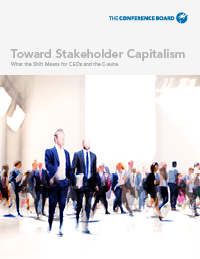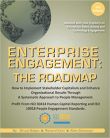The Conference Board: 90% of Execs in Survey Say Stakeholder Capitalism Is Coming...
This working group of senior executives at the Conference Board finds that the Stakeholder Capitalism movement is already affecting their businesses.

The shift to Stakeholder capitalism is durable because it is being driven by investors, employees, customers, business partners, and policymakers, according to a report published by the Conference Board based on a series of roundtable discussions with CEOs and their heads of finance, legal, HR, government relations, technology, marketing, and communications.
The Conference Board is one of the world’s leading think tanks for top organizational leaders and is comprised of top executives from some of the world’s leading companies. Among other findings:
- “The shift is occurring across industries and at all types of companies: public, mutual, and private. This shift is affecting discussions, decisions, and actions at the board and C-suite level.”
- CEOs need a strategy for being a “stakeholder-focused company, which is tailored to suit the company’s particular circumstances, and which has clear objectives for which the company can be held accountable.”
C-Suite Commitment Required
The shift to a stakeholder focus requires a heightened and sustained level of collaboration among the C-suite. As a result, the Conference Board produced reports for CEOs, CFOs, chief legal officers, chief human resources officers, government relations executives, chief marketing officers and the marketing function, and Senior Communications executives.
“The shift toward Stakeholder Capitalism has not only amplified the role and voice of employees, but also dramatically increased the focus on talent at all levels of an organization,” says Rebecca Ray, Executive Vice President of Human Capital, at the Conference Board.
Dana Peterson, the Conference Board Chief Economist, writes: “Leaders must consider how they reinvest in their operations, in their workforce, and in new products and services that may be more environmentally sustainable or socially responsible.”
Says Paul Washington, Executive Director of ESG Center. “Trust is the key to success in the shift toward Stakeholder Capitalism.”
The report states that executives who recognize and embrace the shift now are better positioning themselves and their companies for success in the future. The shift, while not universal, is occurring across industries and at all types of companies: public, mutual, and private. This shift is affecting discussions, decisions, and actions at the board and C-suite level.
In addition, the report says “there is an increased focus on environmental and social issues, diversity, equity, inclusion, employee well-being, workforce management, and community impact. The broader focus on stakeholders is requiring corporate leaders to seek a broader array of information about the potential impact of decisions on stakeholders, so that they can make informed decisions about the trade-offs involved.”
The Goal: Greater Opportunity for All Stakeholders
C-suite executives say “it is also significantly affecting the way they spend their time—both in the topics they are addressing and the internal and external stakeholder groups with whom they are engaging. With a clear strategy, CEOs can drive growth for their company and create broader opportunities for stakeholders. CEOs should ensure their company has a strategy for being a stakeholder-focused company, which is tailored to suit the company’s particular circumstances, and which has clear objectives for which the company can be held accountable.”
The working group finds that “CEOs who embrace radical humanity—that is, who bring their authentic selves to bear in their roles as CEOs—are better positioned to connect with stakeholders. The shift to a stakeholder focus requires a heightened and sustained level of collaboration among the C-suite.
“It’s important to remember that the evolution of capitalism underway is not a zero-sum game. Shareholder value and stakeholder value are not mutually exclusive,” says Lori Esposito Murray, President of the Committee for Economic Development, the public policy center of The Conference Board. “Firms that focus on the long-term welfare of their employees, customers, and communities are better positioned to deliver long-term value for their investors. Moreover, a focus on stakeholders is vital to sustaining capitalism itself.”
“It used to be that social and environmental issues were compartmentalized—somebody else’s problem. Now they’re everybody’s problem,” says Chuck Mitchell, Executive Director of Content Quality at The Conference Board. “Moreover, there is a shift from viewing serving all as something ‘extra, that was nice to do,’ to something that is a business imperative for distinguishing companies in the marketplace and attracting quality talent to grow their businesses.”
Master the “S” of Environmental, Social, Governance (ESG), A.k.a. Stakeholder Capitalism
The Enterprise Engagement Alliance at TheEEA.org is the world’s first and only organization that focuses on outreach, certification and training, and advisory services to help organizations achieve their goals by fostering the proactive involvement of all stakeholders. This includes customers, employees, distribution and supply chain partners, and communities, or anyone connected to an organization’s success.
Training and Thought Leadership
- Founded in 2008, the Enterprise Engagement Alliance provides outreach, learning and certification in Enterprise Engagement, an implementation process for the “S” or Social of Stakeholder Capitalism and Human Capital Management and measurement of engagement across the organization.
- The Enterprise Engagement Alliance provides a training and certification program for business leaders, practitioners, and solution providers, as well as executive briefings and human capital gap analyses for senior leaders.
- The EEA produces an education program for CFOs for the CFO.University training program on Human Capital Management.
- Join the EEA to become a leader in the implementation of the “S” of ESG and Stakeholder Capitalism.
- The ESM information portal and The Enterprise Engagement Advisors Network solution provider marketplace cover all aspects of stakeholder engagement, and the EEA information library lists dozens of resources.
- The RRN information portal and Brand Media Coalition marketplace address the use of brands for gifting, incentives, recognition, and promotions. The BMC information library provides information and research resources.
Video Learning
The EEA Human Capital Management and ROI of Engagement YouTube channel features a growing library of 30- to 60-minute panel discussions with leading experts in all areas of engagement and total rewards.
- Enterprise Engagement for CEOs: The Little Blue Book for People-Centric Capitalists. A quick guide for CEOs.
- Enterprise Engagement: The Roadmap 5th Edition implementation guide. A comprehensive textbook for practitioners, academics, and students.
Enterprise Engagement Advisory Services
The Engagement Agency helps:
- Organizations of all types develop strategic Stakeholder Capitalism and Enterprise Engagement processes and human capital management and reporting strategies; conduct human capital gap analyses; design and implement strategic human capital management and reporting plans that address DEI (Diversity, Equity, and Inclusion), and assist with managed outsourcing of engagement products and services.
- Human resources, sales and marketing solution providers profit from the emerging discipline of human capital management and ROI of engagement through training and marketing services.
- Investors make sense of human capital reporting by public companies.
- Buyers and sellers of companies in the engagement space or business owners or buyers who seek to account for human capital in their mergers and acquistions.
For more information: Contact Bruce Bolger at Bolger@TheICEE.org or call 914-591-7600, ext. 230.















